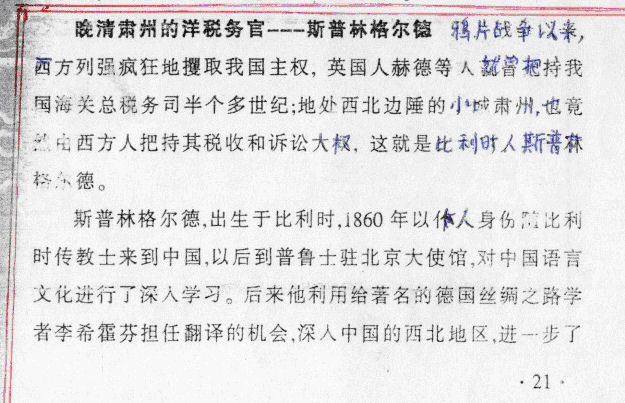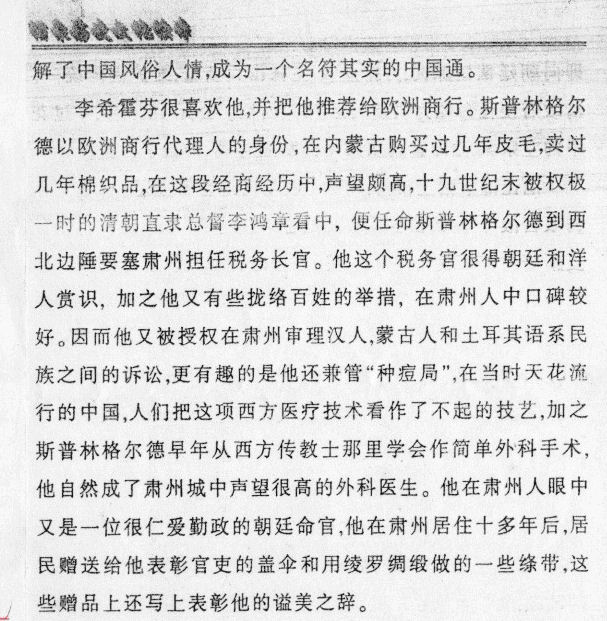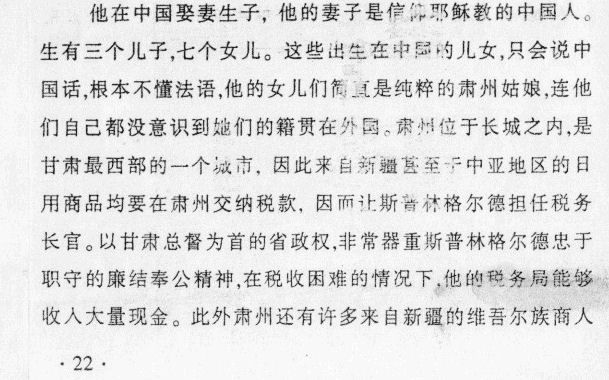
A Chapter from a textbook on the History of Jiuquan
Sent from the Jiuquan People’s Consultative Council on 8/26/05
Translation by Isaac Huang, Tientsin
The Foreign Customs Official of Suzhou in the Late Qing Dynasty – Splingaerd ( 斯普林格尔德 )
Since the Opium War, the western powers had been seizing our sovereignty in a frenzied way. The Englishman, Robert Hart, had been in control of our Customs for over half a century. Even the power for tax collection and judicial power in the remote northwestern town of Suzhou was in the hands of a westerner from Belgium, Splingaerd.
Paul Splingaerd was born in Belgium and came to China as a servant with some Belgian missionaries in 1860 [it was actually 1865]. He learned the Chinese language and culture thoroughly at the Prussian Embassy in Peking. He availed himself of the opportunity of being an interpreter for the famous German in the Silk Road, Richthofen, to further study the Chinese customs and habits and human feelings, and became a true old China hand.

Richthofen liked him very much and recommended him to European firms. Splingaerd engages in the fur trade and sold cotton goods as a European firm agent in Inner Mongolia for several years, and his reputation raised highly during this period of business which drew the attention of the viceroy Li Hongzhang, who was in full power of the Qing Dynasty in the late 19 th Century. Li appointed Splingaerd as t he customs official of Suzhou, an important fort in the northwest border. The imperial court and foreigners thought highly of this official ( Splingaerd), plus he did much for the common people. He was publicly praised by the Suzhou inhabitants. He was then further appointed to treat lawsuits among the hand, Mongolians and people of the Turkist language.
What was more interesting was that he was concurrently in charge of the “Vaccination Bureau” (or Bureau for Vaccination against Smallpox) which people at that time considered this western medical practice to be a terrific skill when smallpox prevailed. In addition, with the simple surgeries that he learned from the western missionaries in his earlier years, Splingaerd was naturally (or eventually) the surgeon of high fame in Suzhou. In the eyes of the Suzhou people, he was an official of the imperial court who loved people and fulfilled his service timely. He lived in Suzhou for more than 10 years and local residents offered him a tribute-covered umbrella, and satin tribute banners with commendations on them.

He married and had children in China. His wife was a Chinese Christian. They had 3 sons and 7 daughters. These children born in China could only speak Chinese, and knew no French. His daughters were just simply pure Suzhou girls who did not have the least idea that their origin was abroad.
Suzhou is inside the Great Wall, and is the westernmost city in Gansu, all articles of everyday use from Xinjiang and even from Middle East region had to pay tax at Suzhou, so he was appointed the customs tax official. The provincial authorities headed by the Gansu viceroy thought very highly of his loyalty and honesty in service. His bureau collected immense cash even under difficult conditions, Also, there were many Uygur merchants from Xinjiang and Mongolian businessmen from the Hang Ai Mountains near Suzhou.
They had many law cases with the Chinese Han people which were tried and awarded by Paul who was richly experienced in business matters. This was the reason why this Belgian could hold this post for such a long time in this remote city, while Chinese officials sent from the interior could not stay so long, maximum 3 to 5 years

Christian Goens - La Louvière - Belgium - mai 2009 - decembre 2009 - tous droits réservés